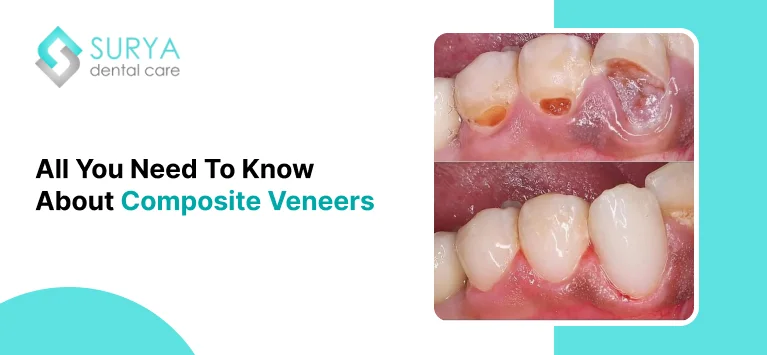Veneers are used most often in cosmetic dentistry to hide any defects on the natural teeth. Veneers are one of the solutions used by dentists in cosmetic dentistry to achieve a flawless smile. Dentists can make veneers from various materials. Likewise, composite veneers are one of the most common types.
From this article by Surya Dental Care, you can learn what composite veneers are, how much composite veneers cost, how composite veneers work, how long composite veneers last, the pros and cons of composite veneers and alternative veneers are available, and what veneers suit you.
What Are Composite Veneers?
Composite veneers are thin layers of composite resin applied to the front surface of the teeth. This resin is sculpted and polished to mimic the natural appearance of your teeth, which makes composite veneers an ideal option for enhancing your smile.
Composite veneers are usually applied directly by the dentist during a single appointment. This makes composite veneers a more convenient and cost-effective option for patients seeking a quick smile makeover than traditional porcelain veneers because they are pre-fabricated in a lab.
How Much Do Composite Veneers Cost?
The cost of composite veneers can vary depending majorly on three factors, They are
- The dentist’s expertise
- The clinic’s location
- The number of veneers required
On average, composite veneers cost between ₹2,000 to ₹7,000 per tooth in India. At the same time, they are generally more affordable than porcelain veneers.
Process of getting composite veneers?
The process of getting composite veneers involves four steps. These four steps do not take much time, and they can all be done in a single visit.
- Consultation: During your consultation your dentist will assess your oral health, talk with you about your cosmetic preferences, and decide whether composite veneers are right for you.
- Preparation: Composite veneers usually require less tooth preparation than porcelain veneers. Among the preparation the important one is to make sure the resin adheres correctly, the tooth surface may occasionally need to be lightly etched.
- Application: The teeth are coated with a composite resin substance that has been selected to match the color of your natural teeth. To get the correct shape and appearance the dentist shapes the resin layer by layer.
- Curing and polishing: A specialized curing lamp is used to solidify the resin once it has been formed. After that, the veneers are polished by the dentist to give them a shiny, smooth surface.
How Long Do Composite Veneers Last?
Composite veneers are not as durable as porcelain veneers, but with proper care, composite veneers can last between 5 to 7 years. Factors influencing the longevity of composite veneers include,
- Oral hygiene practices
- Avoid habits like teeth grinding or biting hard objects
- Regular dental check-ups and maintenance
However, the crucial factor is to extend the lifespan of your composite veneers by following care instructions from your dentist.
Pros and Cons of Composite Veneers
Pros of Composite Veneers
- Affordability: Composite veneers are significantly less expensive than porcelain veneers, which makes them an accessible option for many patients.
- Quick Application: The procedure is typically completed in a single visit. This saves time compared to the multi-visit process for porcelain veneers.
- Reparability: If a composite veneer chips or cracks. Then, it can often be repaired without needing a full replacement.
- Aesthetic Improvement: Composite veneers can effectively conceal stains, chips, and gaps, giving you a natural-looking smile.
Cons of composite veneers
- Durability: Composite veneers are less durable than porcelain veneers and more prone to staining, chipping, and wear.
- Maintenance: They require more frequent touch-ups and maintenance compared to porcelain options.
- Appearance: Composite veneers can look very natural. However, they may not achieve the same level of translucency and shine as porcelain veneers.
Alternative Veneer Options
Suppose composite veneers aren’t the right fit for your needs. It’s not the end because there are other veneers made with different materials available. We have listed them along with their features.
Porcelain Veneers
- More durable and stain-resistant
- Provide a highly natural appearance.
- Require more preparation and are costlier than composite veneers.
Lumineers
- Ultra-thin and minimally invasive
- No tooth preparation is required
- Typically more expensive than both composite and porcelain veneers
Snap-On Veneers
- A temporary, removable solution for cosmetic enhancements
- Ideal for special occasions
Teeth Whitening
- For patients primarily concerned with discoloration, professional teeth whitening might be a simpler and more affordable option.
What Type of Veneer Is Right for You?
Deciding on the right type of veneer depends on several factors. They are,
- Your budget
- Lifestyle
- The extent of the dental imperfections you wish to address.
No need to worry or be confused, as a single consultation with your dentist can help you weigh the options and make an informed decision.
composite vs. porcelain veneers
What to choose among these both? The answer is simple,
Composite veneers are a great choice if you’re looking for a cost-effective and quick solution to minor cosmetic issues. Likewise, porcelain veneers will be a great choice if durability and a premium appearance are your priorities.
Takeaway
Composite veneers offer an excellent combination of affordability, convenience, and aesthetic improvement, making them a popular choice in cosmetic dentistry. At the same time, they may not last as long as porcelain veneers, but their reparability and cost-effectiveness make them a practical option for many patients.
If you are looking for a flawless smile, then consult with Surya Dental Care’s cosmetic dentistry experts. We help you achieve a flawless smile with our dental veneers.








Leave a Comment